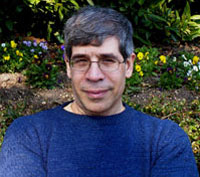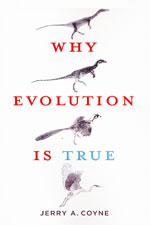THE NEW REPUBLIC
February 4, 2009
SEEING AND BELIEVING
by Jerry A. Coyne
The never-ending attempt to reconcile science and religion, and why it is doomed to fail.
Saving Darwin: How to be a Christian and Believe in Evolution
By Karl W. Giberson
(HarperOne, 248 pp., $24.95)
Only A Theory: Evolution and the Battle for America's Soul
By Kenneth R. Miller
(Viking, 244 pp., $25.95)
...Unfortunately, some theologians with a deistic bent seem to think that they speak for all the faithful. These were the critics who denounced Dawkins and his colleagues for not grappling with every subtle theological argument for the existence of God, for not steeping themselves in the complex history of theology. Dawkins in particular was attacked for writing The God Delusion as a "middlebrow" book. But that misses the point. He did indeed produce a middlebrow book, but precisely because he was discussing religion as it is lived and practiced by real people. The reason that many liberal theologians see religion and evolution as harmonious is that they espouse a theology not only alien but unrecognizable as religion to most Americans.
Statistics support this incompatibility. For example, among those thirty-four countries surveyed, we see a statistically strong negative relationship between the degree of faith and the acceptance of evolution. Countries such as Denmark, France, Japan and the United Kingdom have a high acceptance of Darwinism and low belief in God, while the situation is reversed in countries like Bulgaria, Latvia, Turkey, and the United States. And within America, scientists as a group are considerably less religious than non-scientists. This is not say that such statistics can determine the outcome of a philosophical debate. Nor does it matter whether these statistics mean that accepting science erodes religious faith, or that having faith erodes acceptance of science. (Both processes must surely occur.) What they do show, though, is that people have trouble accepting both at the same time. And given the substance of these respective worldviews, this is no surprise.
This disharmony is a dirty little secret in scientific circles. It is in our personal and professional interest to proclaim that science and religion are perfectly harmonious. After all, we want our grants funded by the government, and our schoolchildren exposed to real science instead of creationism. Liberal religious people have been important allies in our struggle against creationism, and it is not pleasant to alienate them by declaring how we feel. This is why, as a tactical matter, groups such as the National Academy of Sciences claim that religion and science do not conflict. But their main evidence--the existence of religious scientists--is wearing thin as scientists grow ever more vociferous about their lack of faith. Now Darwin Year is upon us, and we can expect more books like those by Kenneth Miller and Karl Giberson. Attempts to reconcile God and evolution keep rolling off the intellectual assembly line. It never stops, because the reconciliation never works.
THE REALITY CLUB: On Jerry Coyne's "DOES THE EMPIRICAL NATURE OF SCIENCE CONTRADICT THE REVELATORY NATURE OF FAITH?"




